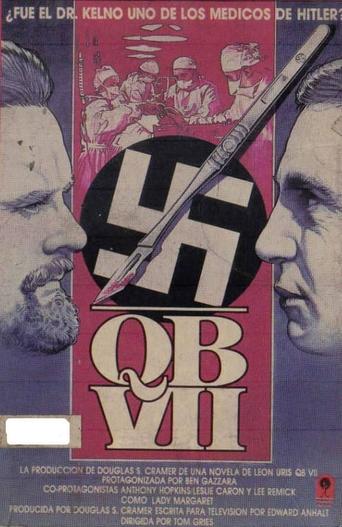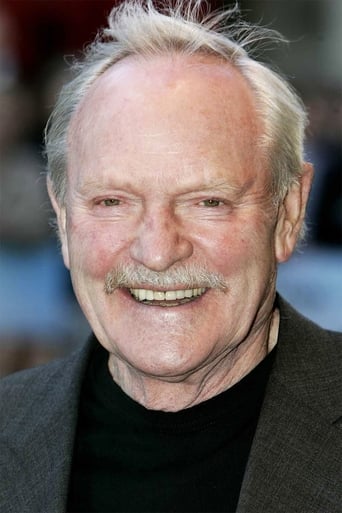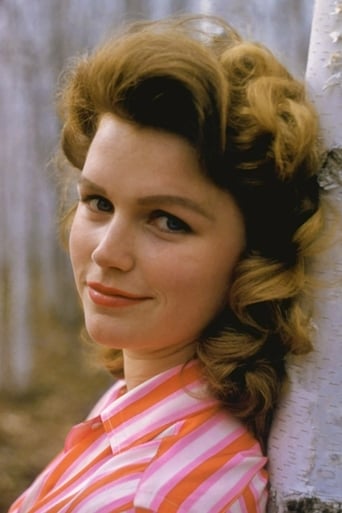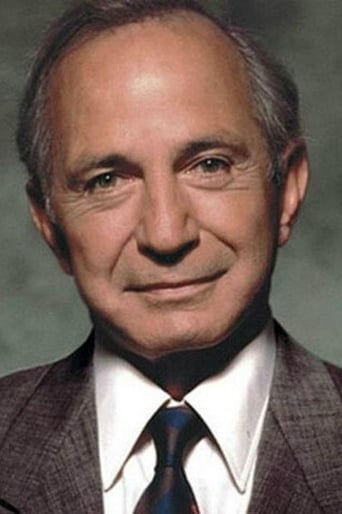

QB VII (1974)
A physician sues a novelist for publishing statements implicating the doctor in Nazi war crimes.
Watch Trailer
Cast


Reviews
Like others, I have not seen this since it's original run. In 1974 I was a HS senior and the subsequent years have drastically changed my opinion.Having worked in law firms and other businesses the courtroom scenes seem so untrue. Even allowing for differences between American and British courts, it is hard to believe a barrister would allow his client to testify at the end of a trial without a delay to review the journals. I understand for dramatic effect it makes sense to do it the way it was written but it's just not realistic. Actually, Kelno's barrister was pretty ineffective from the beginning.From the beginning it was telegraphed how the story would go and how it would end. It's kind of hard to write a good story if Kelno had been innocent of the what was written in the book. But Kelno's barrister had to have known there were people he had operated on that survived and would be brought in to testify. Too much testimony and evidence of what Kelno did while in the camp was going to come out during the trial. Even assuming Kelno was not entirely truthful with his barrister, the solicitor will have have done some due diligence on what the evidence against a client will be. That is what they do. And for Cady, the change from jerk to heroic advocate after his father's death is really hard to believe. Going to school in the Midwest during the '70's even I was aware of the horrors of the Holocaust and the meaning of "Never Again".And just as Kelno's representation was weak, it is unbelievable Cady would take off to Poland in the middle of the trial. Again, trained investigators would be sent to Poland (if they were actually allowed) to dig up facts and evidence. Even assuming the Communist government would allow such investigation in Poland, it was really hard to believe a woman would turn from defiance to acquiescence in minutes because Cady made her aware of God.Kelno knew the facts and had he been honest with his counsel even a middling barrister would have been able to account for opposing testimony and evidence. For a story revolving around court proceedings, the story seemed dumbed down for the audience.Now I know this is a story and not meant to document what a real trial would look like (just as the crimes on Law & Order are solved and the perps convicted in 60 minutes is unrealistic) but what seemed powerfully dramatic to a teenager loses a lot after more than 40 years.If you are are looking for a realistic courtroom drama, this is below the normal Law & Order episode (almost every L&O episode has evidence suppressed by a judge when real defense attorneys will tell you they have never won a suppression hearing in decades of practice). For realism you are better off watching an episode of Rake. I wish this courtroom drama dealing with the horrors of the Holocaust had done a better job of demonstrating the difficulty of proving the culpability of the numerous cogs of the final solution.
It was too long, and Anthony Hopkins telegraphed the fact that he had something to hide from the very beginning.I read the book before I saw the miniseries when both were new. I again watched the miniseries, and though my memory of the book has faded, it could only be much better than what made it to television. Maybe my familiarity with the book helped fill in the gaps when I first watched the series.It would have been very interesting to explore Kelno's motivations--a need to atone? A death wish? Did he really hate Jews, as opposed to simply being a coward who collaborated? Anthony Hopkins certainly conveyed a troubled individual. It would have been interesting to find out why.And Cady--he was a total louse in the first half, and then was suddenly redeemed and transformed by his father's death. Not believable. And wasn't that Juliet Mills as the first Mrs Cady? A totally wasted part.I don't regret watching it again. A seventies miniseries was not usually created or edited to be compelling and concise, but to furnish enough material to surround a sufficient number of commercials.
Excellent performances from Anthony Hopkins and Leslie Caron only go so far to help this miniseries overcome both over-length and the despicable character portrayed by Ben Gazzara. Are we suppose to applaud this jerk who forces someone to relive the horrors of the Holocast to serve his own ends and allows him to be blackmailed with the threat of the loss of his family even it he feels it is in the course of justice. Where is that man's justice? Not saying that what the other character is accused of isn't reprehensible too. Lee Remick is listed as a star of this but her appearance here is strictly window dressing added for marquee value. The production values are high and this is a good example of when great care was taken with network miniseries and they ruled the airwaves.
I write this from a distance of 31 years after the fact. Time colors ones perspective. Anthony Hopkins is one of my all time favorite actors and I hated to see him as one of the doctors who experimented horrifically on Jewish patients. Nevertheless, it is a part designed for at least an Emmy nomination and I feel that Hopkins deserved one. Is it remotely possible that he was deliberately overlooked BECAUSE of the part he played? Perhaps. I would liked to have given the film a higher rating but feel it was sufficiently flawed to justify the 7 I gave it. Here are my reasons for doing so. 1. Abe Cady was an SOB throughout most of Part 1. His father dies and a single visit to bury his father in Israel changes his entire persona virtually overnight. It does not ring true. 2. Samantha Cady is the good guy in this and she is totally abandoned by her husband, son and the filmmakers; a fate she does not deserve. It is as if she were put in the film simply to produce a son who deserts his mother and is destined to die as punishment for Abe's early transgressions. 3. The important parts of the film are the trial sequences, a fair portion of which was devoted to exposing Jewish atrocities which had nothing to do with Cady's charges against Adam Kelno. 4. Unless I am mistaken, there was a point where Chief Justice Gilroy (Jack Hawkins) allows testimony subject to later connection which connection was never made. 5. I fail to understand why the Polish woman(?) revealed to Abe Cady the name of the man she loved who was in possession of a record that would destroy Kelno. 6. Unless I am mistaken, David Shawcross, Cady's lawyer played by Dan O'Herlihy, is only made aware of those records at the final moment in the trial and yet, is suddenly so thoroughly familiar with it that he is able to destroy Kelno's credibility point by point in the most dramatic sequence in the film. I suspect that if I had read the Leon Uris book, I would have given the film an even lower rating.




